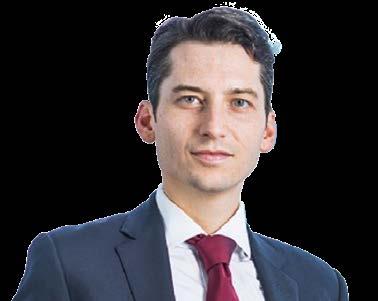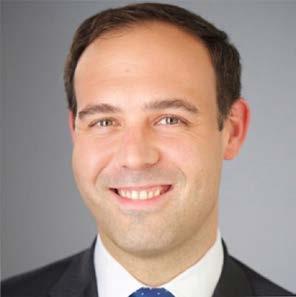
5 minute read
equity for the year ahead? What will the future of ESG investing look like?
What will the future of ESG investing look like?
GREG BOWES Co-Founder & Managing Principal, Emerging Markets, Albright Capital We think ESG investing will progressively and increasingly become integrated into normal investment workstreams with more investors seeking a mix of commercial returns, portfolio diversification benefits, and positive social impact. Heretofore, strategies have been defined in an unrealistically binary fashion. The strategy, or the particular investment, has social impact or it does not. From an evolutionary standpoint this was probably inevitable, and it has been accentuated by the understandable fear of “greenwashing.” But reality intrudes, and trade-offs are inevitable.
Looked at another way, the extremes in the ESG/Impact continuum are relatively easy to identify. On one end, there are strategies that sacrifice financial returns and provide concessionary capital in the interest of advancing a particular social good. On the other end, some strategies seek financial returns above all, with only a modicum of ESG review as a form of financial and reputational risk management.
Albright Capital believes there is room for both approaches and everything in between, but the strategies that meet truly multiple objectives, and maintain the prospect of commercial returns, will almost certainly fall in a middle ground and require interdisciplinary skills and perspectives. For example, it is easy to see the social benefits of renewable energy but, for precisely this reason, it has attracted a flood of capital, which has naturally driven down potential returns.
As with all investing, if it were easy, everyone would do it! Finding interesting angles and niches undiscovered by others will be the challenge. BRYN GOSTIN Managing Director & Co-Chair of Responsible Investment Committee, Capital Dynamics It is our belief at Capital Dynamics that sound ESG underwriting will play a critically important role in value creation over the medium to long-term, due to demographic changes, shifting consumer preferences, risk mitigation, and increased mobilisation to advance the United Nations sustainable development goals. As the link between ESG and performance comes into focus, we anticipate a virtuous cycle whereby investors will come to naturally care more about these issues which will, in turn, require all asset managers to meaningfully commit to responsible investment as a discipline to attract capital flows. By the same token, we expect the private markets to play a leading role in the evolution of this virtuous cycle because of the unique attributes of the asset class. In the private markets, experienced investors will have the opportunity to substantially increase the value of their investment by enhancing the environmental, social and governance characteristics of a portfolio company over a longer holding period and without shorter term pressures from the public markets. Increasingly, it is Capital Dynamics belief, supported by M&A research from the investment banking universe, that this will lead to greater multiple expansion for an investment on exit. As an organisation which cares deeply about both ESG and the investment returns we deliver to our clients, we look forward to these developments.



RUTH LANE ESG Officer, Head of Investor Relations, ATL Partners In 2020, ESG was elevated from something on which GPs focused to varying degrees depending on each GP’s views, to something on which every GP now must focus: from its investment processes, to its portfolio companies and to its human capital development. We clearly see LPs working ESG considerations into investment decisions at the outset of investment diligence, versus viewing it as a “check the box” exercise at the approval phase. As such, it will be increasingly important for GPs to be transparent with LPs about how ESG matters are handled.
At ATL Partners, we have worked ESG considerations into our processes for years, and this year, we have made a serious effort to better synthesise how we think about ESG matters so that we can more effectively communicate those efforts to our LPs. We are also working to enhance our efforts by crystallising what steps we take to manage and monitor ESG at the portfolio company level. Finally, and critically, we are engaging directly with our LPs to better understand their ESG goals.
In the future, it will be critical that GPs are able to address: • Oversight: It starts at the top. Firms will need to ensure that ESG is overseen at the senior level as a critical part of the investment process. • Process: GPs will need to formally work ESG into their investment diligence, management, and exits. LPs want to know whether ESG is a true priority for
GPs or not. • Transparency: GPs will need to be effective communicators with their LPs. As stewards of their capital dollars, GPs should be able to explain to their clients what they are doing about ESG. GPs will also need to be open to an ongoing, working dialogue with their clients with respect to how to think about ESG matters, and how they can continue to improve. ROBERT ESPOSITO ESG Counsel, Apollo The coronavirus pandemic has had devastating effects as a health, economic and social crisis, and one that has taken a greater toll on the wellbeing of our most vulnerable populations. It has exacerbated many longstanding societal issues, and as a result, increased the urgency for the private sector to play a bigger role in creating a more equitable, sustainable and prosperous world.
As an alternative investment manager, the focus on private market solutions has led to greater client interest in our longstanding ESG programme, our new Impact investing platform, and our overall behaviour as a responsible operator and employer. Like Apollo, our investors believe we can and should have a positive impact on society.
In terms of upcoming shifts, the pandemic has plainly demonstrated the importance of good environmental, social and governance practices, not just from a risk management perspective but also how it can drive better business outcomes as customers and investors reward the most responsible companies. We expect to continue seeing increased resources, transparency and standardised reporting from GPs and LPs alike as the measurement of ESG performance and progress evolves. At Apollo, for example, our ESG reporting programme is entering its 12th year, and we continue to dedicate additional time and resources to it each year because we recognise that transparency on ESG issues is both a strategic and moral imperative.
In the future, we hope and expect there to be no discernible difference between a private equity fund and a so-called ESG private equity fund, as managers and LPs continue to appreciate that ESG is core to business sustainability and value creation, improving companies, livelihoods and our world. We’re optimistic that private equity can continue to play a more meaningful role in the economy and in shaping a sustainable and equitable future.











